Abstract
To evaluate the hypothesis of increased kidney cancer risk after exposure to hydrocarbons, especially those present in gasoline, we conducted a case-control study in a cohort of approximately 100,000 male refinery workers from five petroleum companies. A review of 18,323 death certificates identified 102 kidney cancer cases, to each of whom four controls were matched by refinery location and decade of birth. Work histories, containing an average of 15.7 job assignments per subject, were found for 98% of the cases and 94% of the controls. To each job, industrial hygienists assigned semiquantitative ratings for the intensity and frequency of exposures to three hydrocarbon categories: nonaromatic liquid gasoline distillates, aromatic hydrocarbons, and the more volatile hydrocarbons. Ratings of "present" or "absent" were assigned for seven additional exposures: higher boiling hydrocarbons, polynuclear aromatic hydrocarbons, asbestos, chlorinated solvents, ionizing radiation, and lead. Each exposure had either no association or a weak association with kidney cancer. For the hydrocarbon category of principal a priori interest, the nonaromatic liquid gasoline distillates, the estimated relative risk (RR) for any exposure above refinery background was 1.0 (95% confidence interval [CI] 0.5-1.9). Analyses of cumulative exposures and of exposures in varying time periods before kidney cancer occurrence also produced null or near-null results. In an analysis of the longest job held by each subject (average duration 9.2 years or 40% of the refinery work history), three groups appeared to be at increased risk: laborers (RR = 1.9, 95% CI 1.0-3.9); workers in receipt, storage, and movements (RR = 2.5, 95% CI 0.9-6.6); and unit cleaners (RR = 2.3, 95% CI 0.5-9.9).
Full text
PDF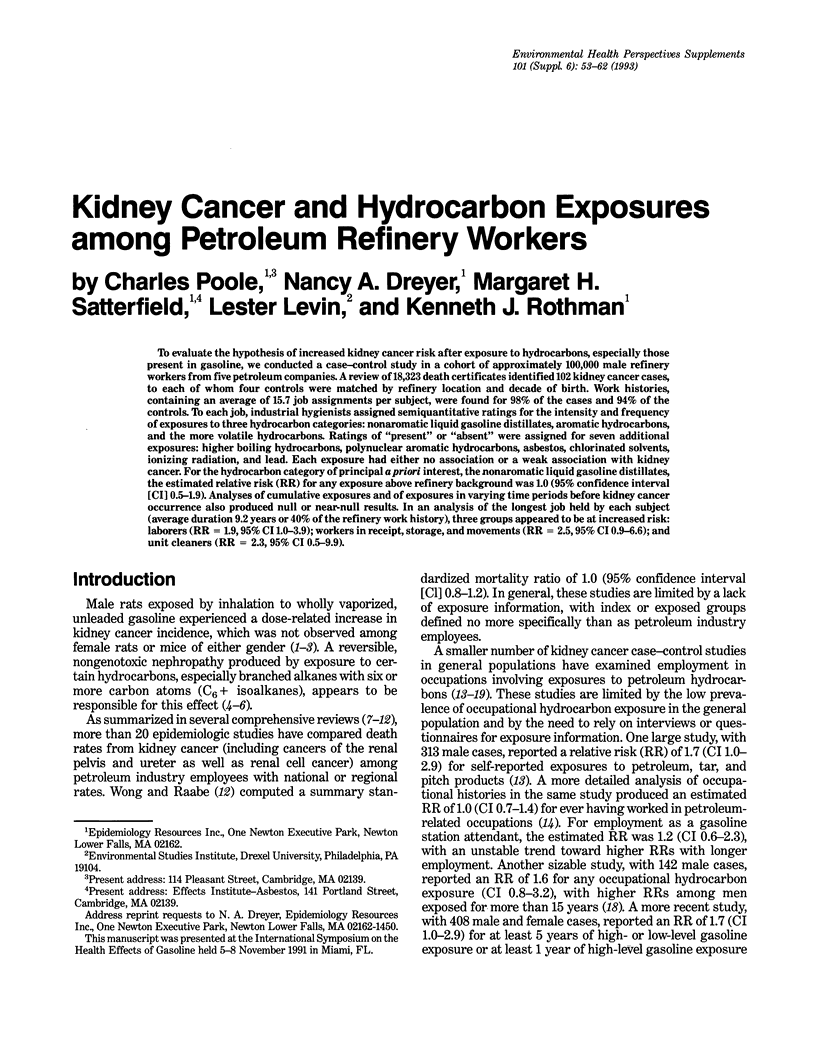
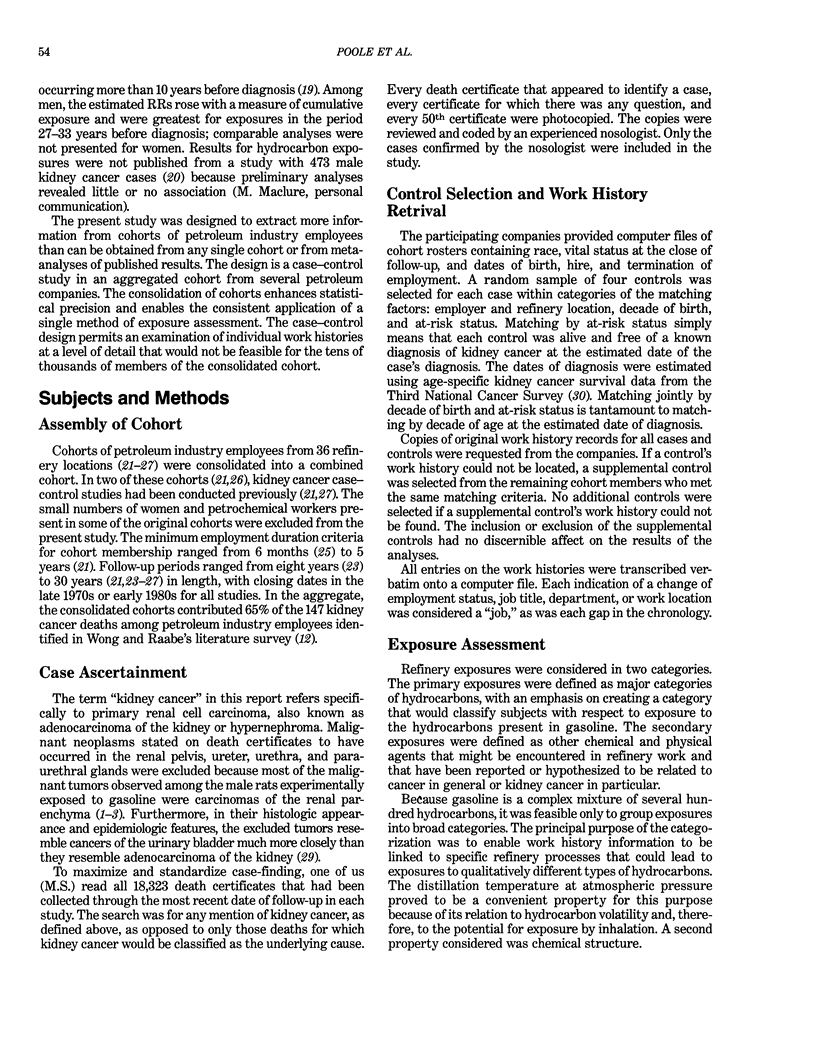
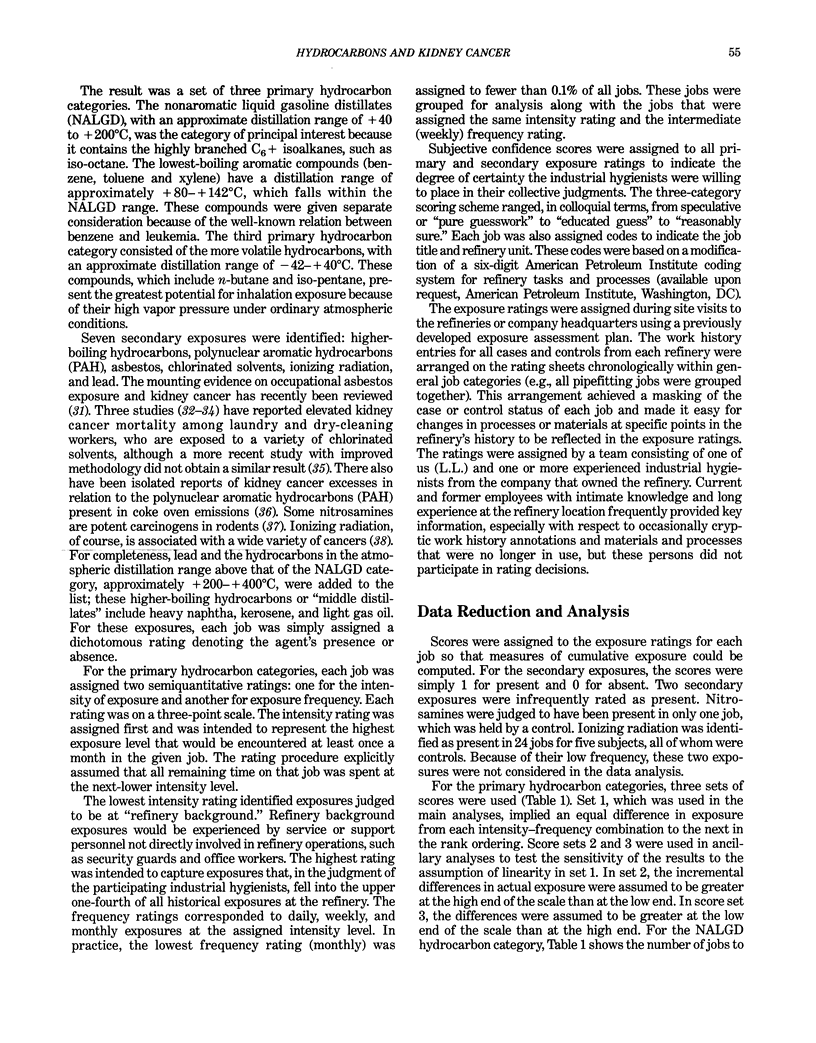
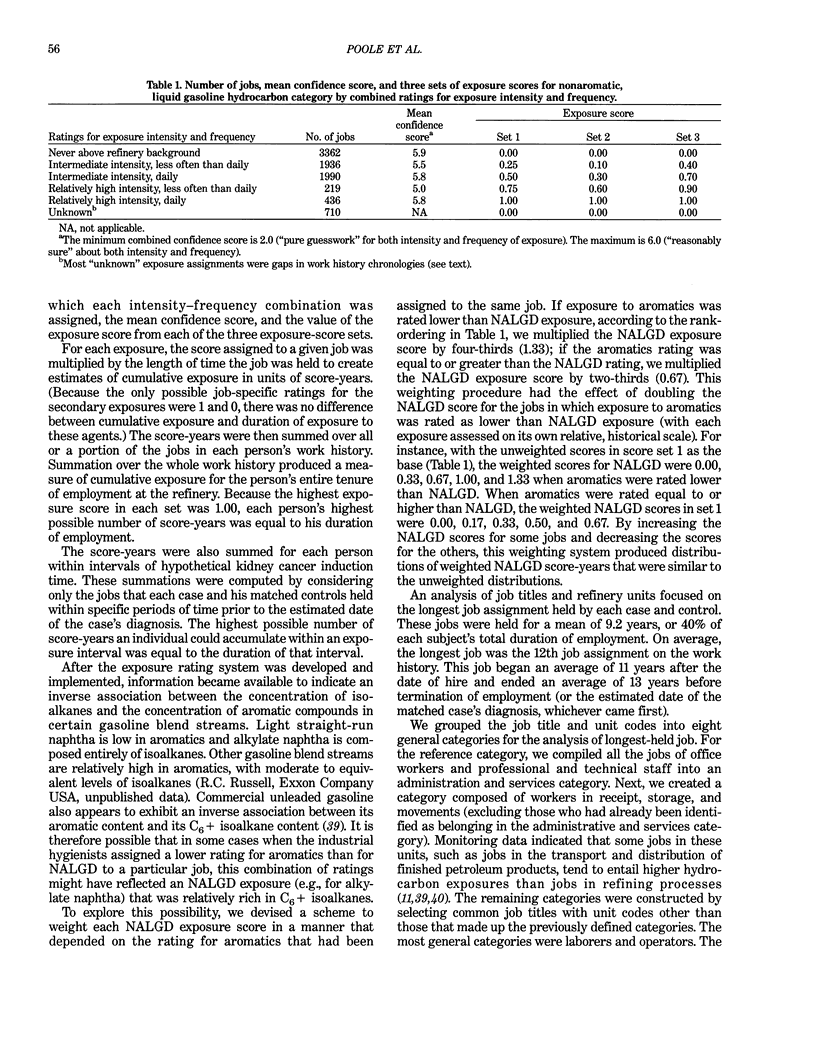
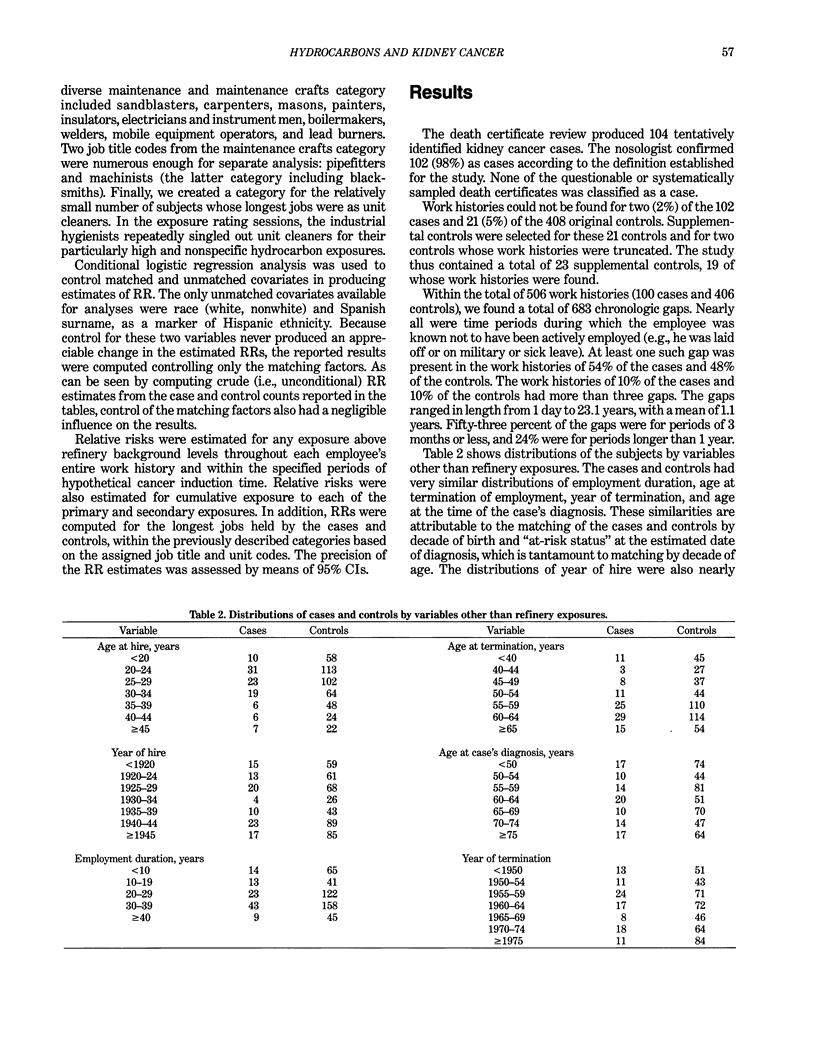
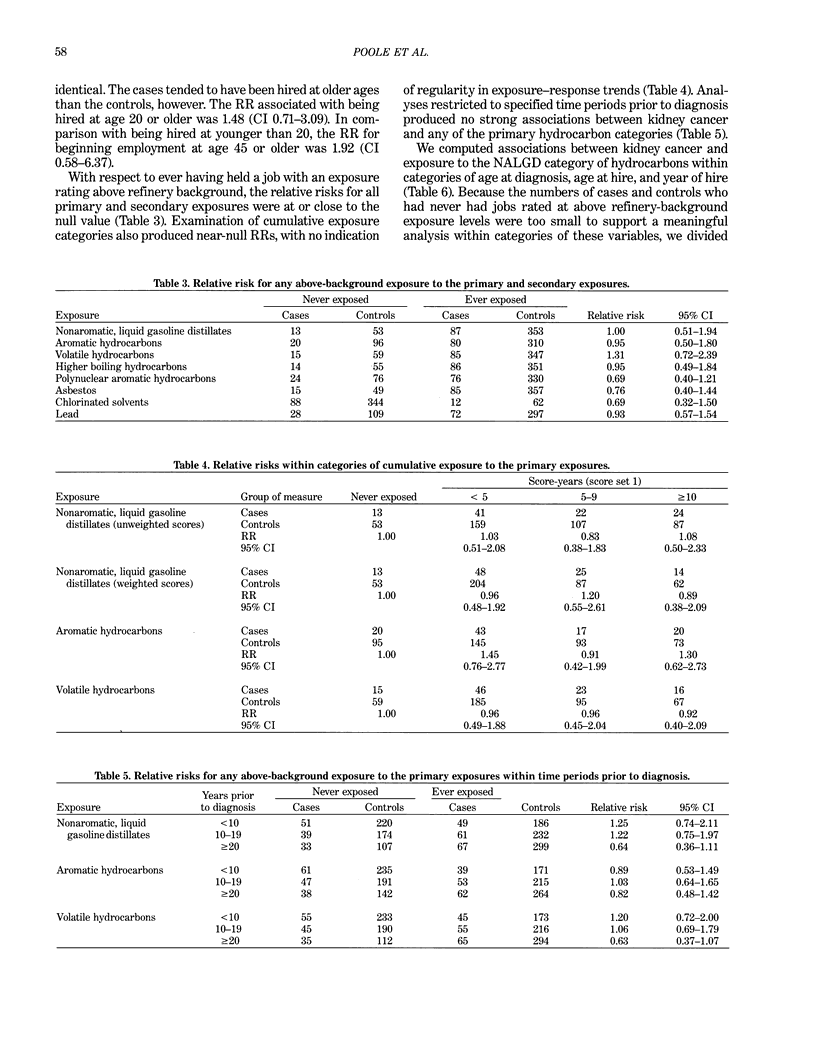
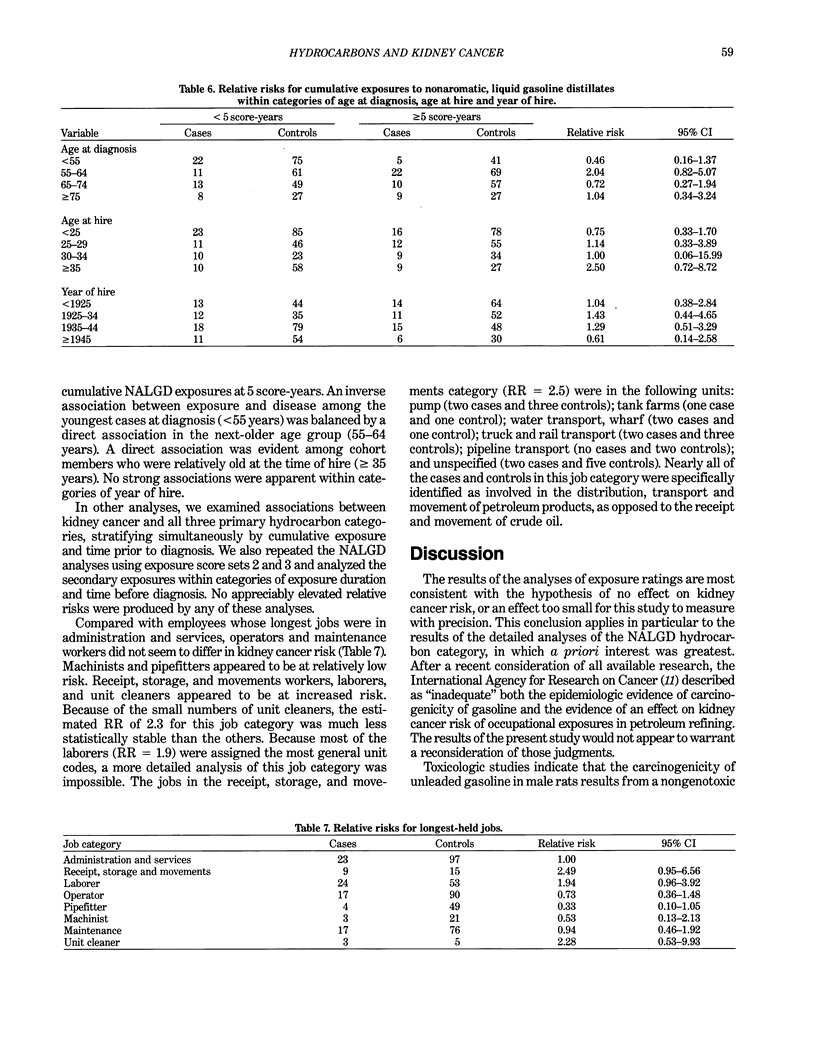
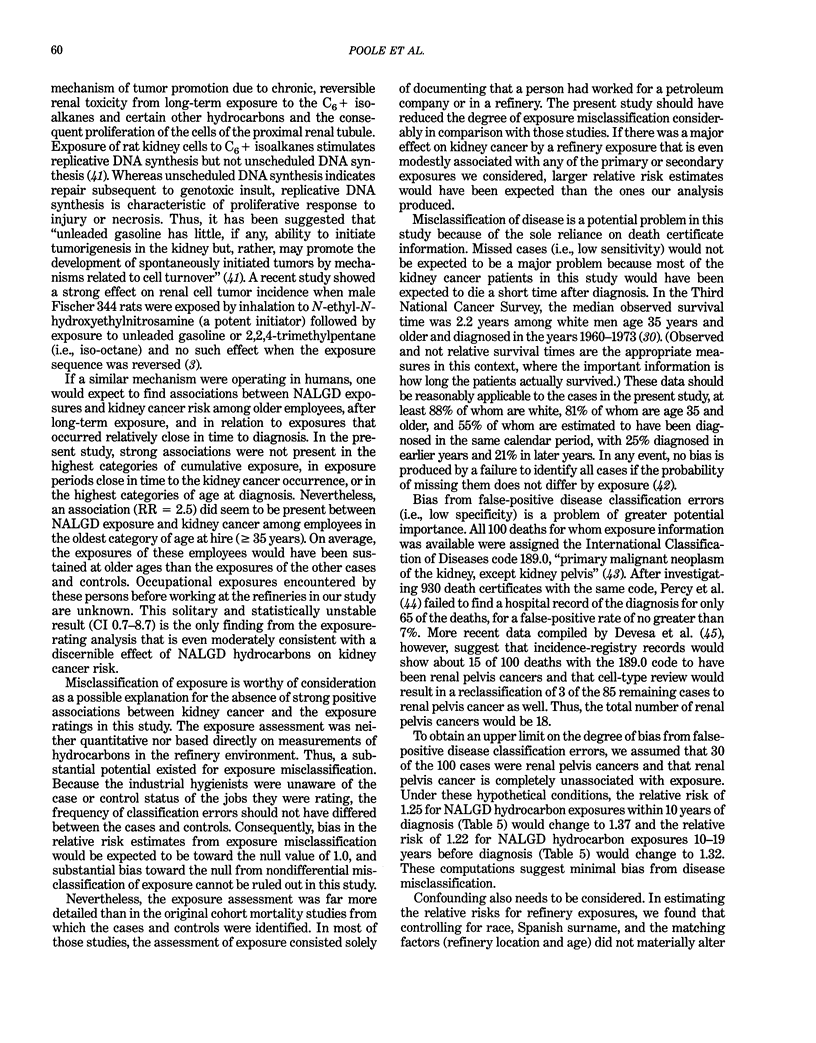
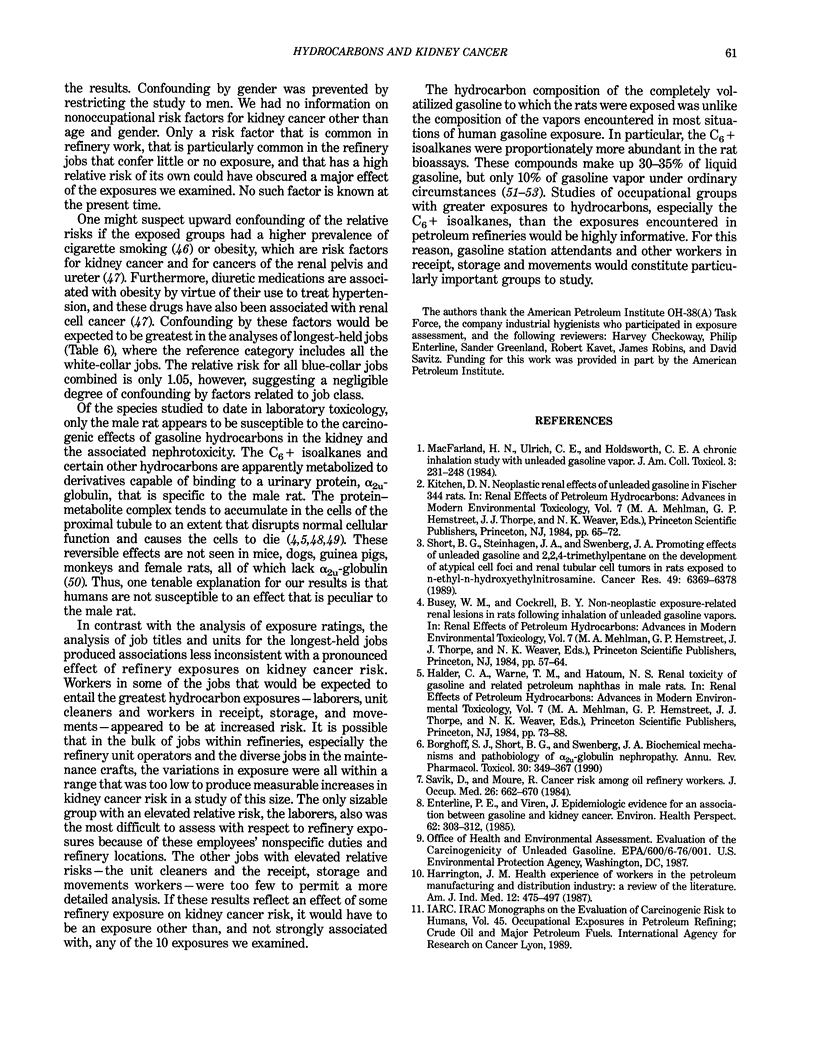
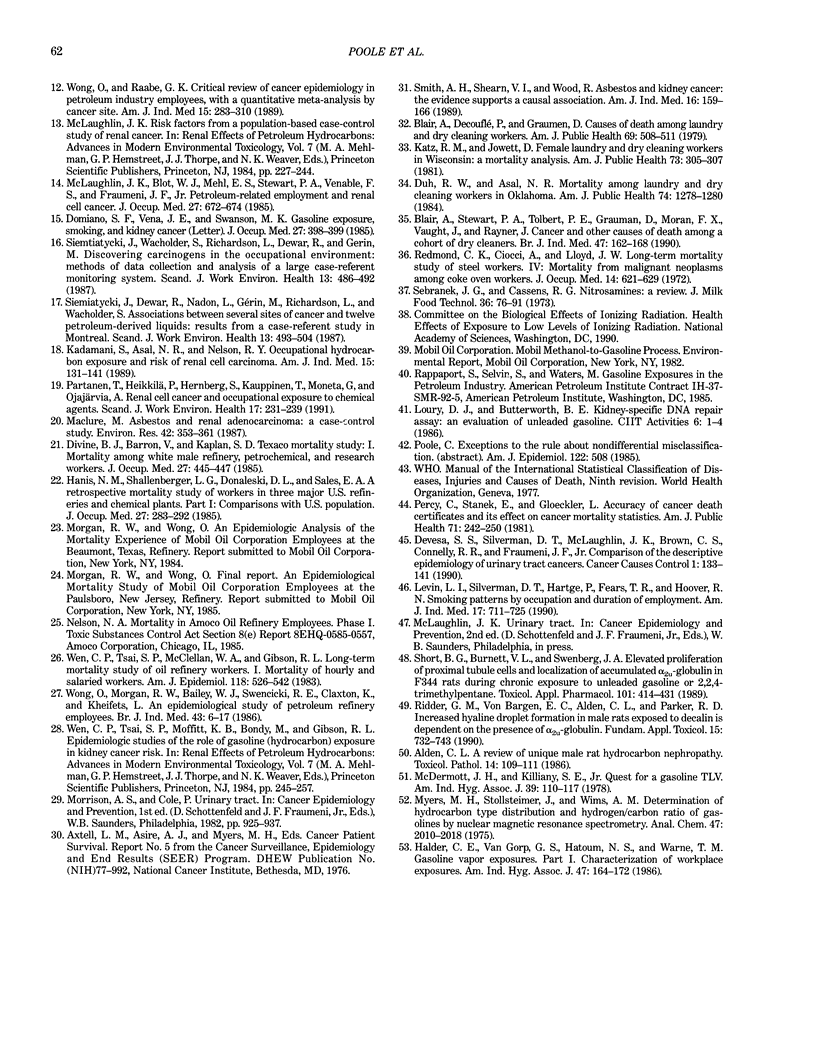
Selected References
These references are in PubMed. This may not be the complete list of references from this article.
- Alden C. L. A review of unique male rat hydrocarbon nephropathy. Toxicol Pathol. 1986;14(1):109–111. doi: 10.1177/019262338601400113. [DOI] [PubMed] [Google Scholar]
- Blair A., Decoufle P., Grauman D. Causes of death among laundry and dry cleaning workers. Am J Public Health. 1979 May;69(5):508–511. doi: 10.2105/ajph.69.5.508. [DOI] [PMC free article] [PubMed] [Google Scholar]
- Blair A., Stewart P. A., Tolbert P. E., Grauman D., Moran F. X., Vaught J., Rayner J. Cancer and other causes of death among a cohort of dry cleaners. Br J Ind Med. 1990 Mar;47(3):162–168. doi: 10.1136/oem.47.3.162. [DOI] [PMC free article] [PubMed] [Google Scholar]
- Borghoff S. J., Short B. G., Swenberg J. A. Biochemical mechanisms and pathobiology of alpha 2u-globulin nephropathy. Annu Rev Pharmacol Toxicol. 1990;30:349–367. doi: 10.1146/annurev.pa.30.040190.002025. [DOI] [PubMed] [Google Scholar]
- Devesa S. S., Silverman D. T., McLaughlin J. K., Brown C. C., Connelly R. R., Fraumeni J. F., Jr Comparison of the descriptive epidemiology of urinary tract cancers. Cancer Causes Control. 1990 Sep;1(2):133–141. doi: 10.1007/BF00053164. [DOI] [PubMed] [Google Scholar]
- Divine B. J., Barron V., Kaplan S. D. Texaco mortality study. I. Mortality among refinery, petrochemical, and research workers. J Occup Med. 1985 Jun;27(6):445–447. [PubMed] [Google Scholar]
- Domiano S. F., Vena J. E., Swanson M. K. Gasoline exposure, smoking, and kidney cancer. J Occup Med. 1985 Jun;27(6):398–399. [PubMed] [Google Scholar]
- Duh R. W., Asal N. R. Mortality among laundry and dry cleaning workers in Oklahoma. Am J Public Health. 1984 Nov;74(11):1278–1280. doi: 10.2105/ajph.74.11.1278. [DOI] [PMC free article] [PubMed] [Google Scholar]
- Enterline P. E., Viren J. Epidemiologic evidence for an association between gasoline and kidney cancer. Environ Health Perspect. 1985 Oct;62:303–312. doi: 10.1289/ehp.8562303. [DOI] [PMC free article] [PubMed] [Google Scholar]
- Halder C. A., Van Gorp G. S., Hatoum N. S., Warne T. M. Gasoline vapor exposures. Part I. Characterization of workplace exposures. Am Ind Hyg Assoc J. 1986 Mar;47(3):164–172. [PubMed] [Google Scholar]
- Hanis N. M., Shallenberger L. G., Donaleski D. L., Sales E. A. A retrospective mortality study of workers in three major U.S. refineries and chemical plants. Part 1: Comparisons with U.S. population. J Occup Med. 1985 Apr;27(4):283–292. [PubMed] [Google Scholar]
- Harrington J. M. Health experience of workers in the petroleum manufacturing and distribution industry: a review of the literature. Am J Ind Med. 1987;12(5):475–497. doi: 10.1002/ajim.4700120503. [DOI] [PubMed] [Google Scholar]
- Kadamani S., Asal N. R., Nelson R. Y. Occupational hydrocarbon exposure and risk of renal cell carcinoma. Am J Ind Med. 1989;15(2):131–141. doi: 10.1002/ajim.4700150202. [DOI] [PubMed] [Google Scholar]
- Katz R. M., Jowett D. Female laundry and dry cleaning workers in Wisconsin: a mortality analysis. Am J Public Health. 1981 Mar;71(3):305–307. doi: 10.2105/ajph.71.3.305. [DOI] [PMC free article] [PubMed] [Google Scholar]
- Levin L. I., Silverman D. T., Hartge P., Fears T. R., Hoover R. N. Smoking patterns by occupation and duration of employment. Am J Ind Med. 1990;17(6):711–725. doi: 10.1002/ajim.4700170606. [DOI] [PubMed] [Google Scholar]
- Maclure M. Asbestos and renal adenocarcinoma: a case-control study. Environ Res. 1987 Apr;42(2):353–361. doi: 10.1016/s0013-9351(87)80200-1. [DOI] [PubMed] [Google Scholar]
- McDermott H. J., Killiany S. E., Jr Quest for a gasoline TLV. Am Ind Hyg Assoc J. 1978 Feb;39(2):110–117. doi: 10.1080/0002889778507724. [DOI] [PubMed] [Google Scholar]
- McLaughlin J. K., Blot W. J., Mehl E. S., Stewart P. A., Venable F. S., Fraumeni J. F., Jr Petroleum-related employment and renal cell cancer. J Occup Med. 1985 Sep;27(9):672–674. [PubMed] [Google Scholar]
- Partanen T., Heikkilä P., Hernberg S., Kauppinen T., Moneta G., Ojajärvi A. Renal cell cancer and occupational exposure to chemical agents. Scand J Work Environ Health. 1991 Aug;17(4):231–239. doi: 10.5271/sjweh.1708. [DOI] [PubMed] [Google Scholar]
- Percy C., Stanek E., 3rd, Gloeckler L. Accuracy of cancer death certificates and its effect on cancer mortality statistics. Am J Public Health. 1981 Mar;71(3):242–250. doi: 10.2105/ajph.71.3.242. [DOI] [PMC free article] [PubMed] [Google Scholar]
- Redmond C. K., Ciocco A., Lloyd J. W., Rush H. W. Long-term mortality study of steelworkers. VI. Mortality from malignant neoplasms among coke oven workers. J Occup Med. 1972 Aug;14(8):621–629. [PubMed] [Google Scholar]
- Ridder G. M., Von Bargen E. C., Alden C. L., Parker R. D. Increased hyaline droplet formation in male rats exposed to decalin is dependent on the presence of alpha 2u-globulin. Fundam Appl Toxicol. 1990 Nov;15(4):732–743. doi: 10.1016/0272-0590(90)90189-q. [DOI] [PubMed] [Google Scholar]
- Savitz D. A., Moure R. Cancer risk among oil refinery workers. A review of epidemiologic studies. J Occup Med. 1984 Sep;26(9):662–670. [PubMed] [Google Scholar]
- Short B. G., Burnett V. L., Swenberg J. A. Elevated proliferation of proximal tubule cells and localization of accumulated alpha 2u-globulin in F344 rats during chronic exposure to unleaded gasoline or 2,2,4-trimethylpentane. Toxicol Appl Pharmacol. 1989 Dec;101(3):414–431. doi: 10.1016/0041-008x(89)90191-9. [DOI] [PubMed] [Google Scholar]
- Short B. G., Steinhagen W. H., Swenberg J. A. Promoting effects of unleaded gasoline and 2,2,4-trimethylpentane on the development of atypical cell foci and renal tubular cell tumors in rats exposed to N-ethyl-N-hydroxyethylnitrosamine. Cancer Res. 1989 Nov 15;49(22):6369–6378. [PubMed] [Google Scholar]
- Siemiatycki J., Dewar R., Nadon L., Gérin M., Richardson L., Wacholder S. Associations between several sites of cancer and twelve petroleum-derived liquids. Results from a case-referent study in Montreal. Scand J Work Environ Health. 1987 Dec;13(6):493–504. doi: 10.5271/sjweh.2008. [DOI] [PubMed] [Google Scholar]
- Siemiatycki J., Wacholder S., Richardson L., Dewar R., Gérin M. Discovering carcinogens in the occupational environment. Methods of data collection and analysis of a large case-referent monitoring system. Scand J Work Environ Health. 1987 Dec;13(6):486–492. doi: 10.5271/sjweh.2009. [DOI] [PubMed] [Google Scholar]
- Smith A. H., Shearn V. I., Wood R. Asbestos and kidney cancer: the evidence supports a causal association. Am J Ind Med. 1989;16(2):159–166. doi: 10.1002/ajim.4700160207. [DOI] [PubMed] [Google Scholar]
- Wen C. P., Tsai S. P., McClellan W. A., Gibson R. L. Long-term mortality study of oil refinery workers. I. Mortality of hourly and salaried workers. Am J Epidemiol. 1983 Oct;118(4):526–542. doi: 10.1093/oxfordjournals.aje.a113658. [DOI] [PubMed] [Google Scholar]
- Wong O., Morgan R. W., Bailey W. J., Swencicki R. E., Claxton K., Kheifets L. An epidemiological study of petroleum refinery employees. Br J Ind Med. 1986 Jan;43(1):6–17. doi: 10.1136/oem.43.1.6. [DOI] [PMC free article] [PubMed] [Google Scholar]
- Wong O., Raabe G. K. Critical review of cancer epidemiology in petroleum industry employees, with a quantitative meta-analysis by cancer site. Am J Ind Med. 1989;15(3):283–310. doi: 10.1002/ajim.4700150305. [DOI] [PubMed] [Google Scholar]


